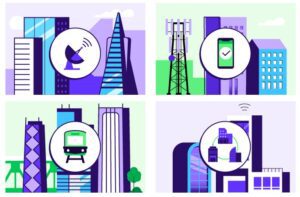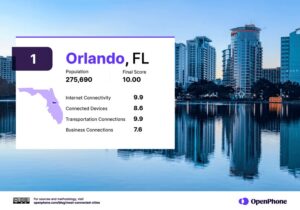 Whether to attract remote workers, to face the rising costs of transportation (namely gas), or simply as technology continues to evolve at lightspeeds. Future-focused cities must offer connections both digital and physical to local residents and businesses.
Whether to attract remote workers, to face the rising costs of transportation (namely gas), or simply as technology continues to evolve at lightspeeds. Future-focused cities must offer connections both digital and physical to local residents and businesses.
So, OpenPhone aimed to find which US cities are offering their community a plethora of modern connections in a new study — and Orlando scored the top spot.
“Small but mighty Orlando is a digital tour de force, ranking #2 in the rate of hotspots per 1K people and #2 on transportation connections overall, despite being on the smaller side,” the study said.
 Orlando’s multitude of local WiFi hotspots and electric charge stations per 1K residents are some of the best (4.4 for every 1K residents for both factors). The city is making investments to expand both air and rail travel. Plus, Orlando has an active and thriving tourism industry powering local incubators. (And, in the latest news we’ve seen that local Disney is gearing up with meta in mind.)
Orlando’s multitude of local WiFi hotspots and electric charge stations per 1K residents are some of the best (4.4 for every 1K residents for both factors). The city is making investments to expand both air and rail travel. Plus, Orlando has an active and thriving tourism industry powering local incubators. (And, in the latest news we’ve seen that local Disney is gearing up with meta in mind.)
The 25 most connected cities in America study also found that:
- The 3 best cities to serve those looking for ultimate connectivity in modern times are: #1 Orlando, #2 Denver, and #3 San Francisco.
- 3 Florida cities land in the top 25: #1 Orlando, #12 Tampa, and #17 Miami.
- 7 of the top 25 are on the West Coast, 5 of those are in California alone.
- Medium means more, the largest cities failed to offer the necessary abundance of connections to serve the local population. The average city population of the top 25 is 760K, for the top 10 it’s 550K.
From free city WiFi offering equal access to local residents to a multitude of electric charge stations, and cities with higher percentages of residents with handhelds to a wide range of coworking spaces, the study defines, scores, and ranks 4 major pillars: internet access, residents with devices, access to transportation, and business networks. Cities offering the most connectivity per resident across all categories performed best.


